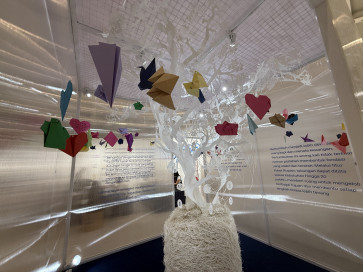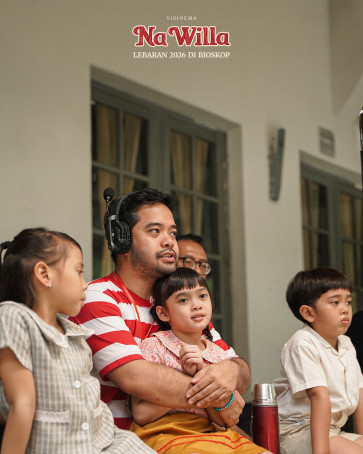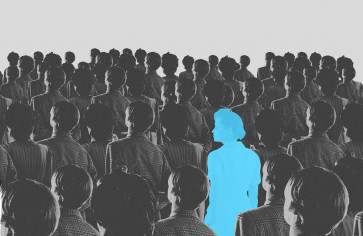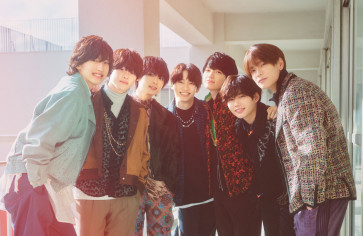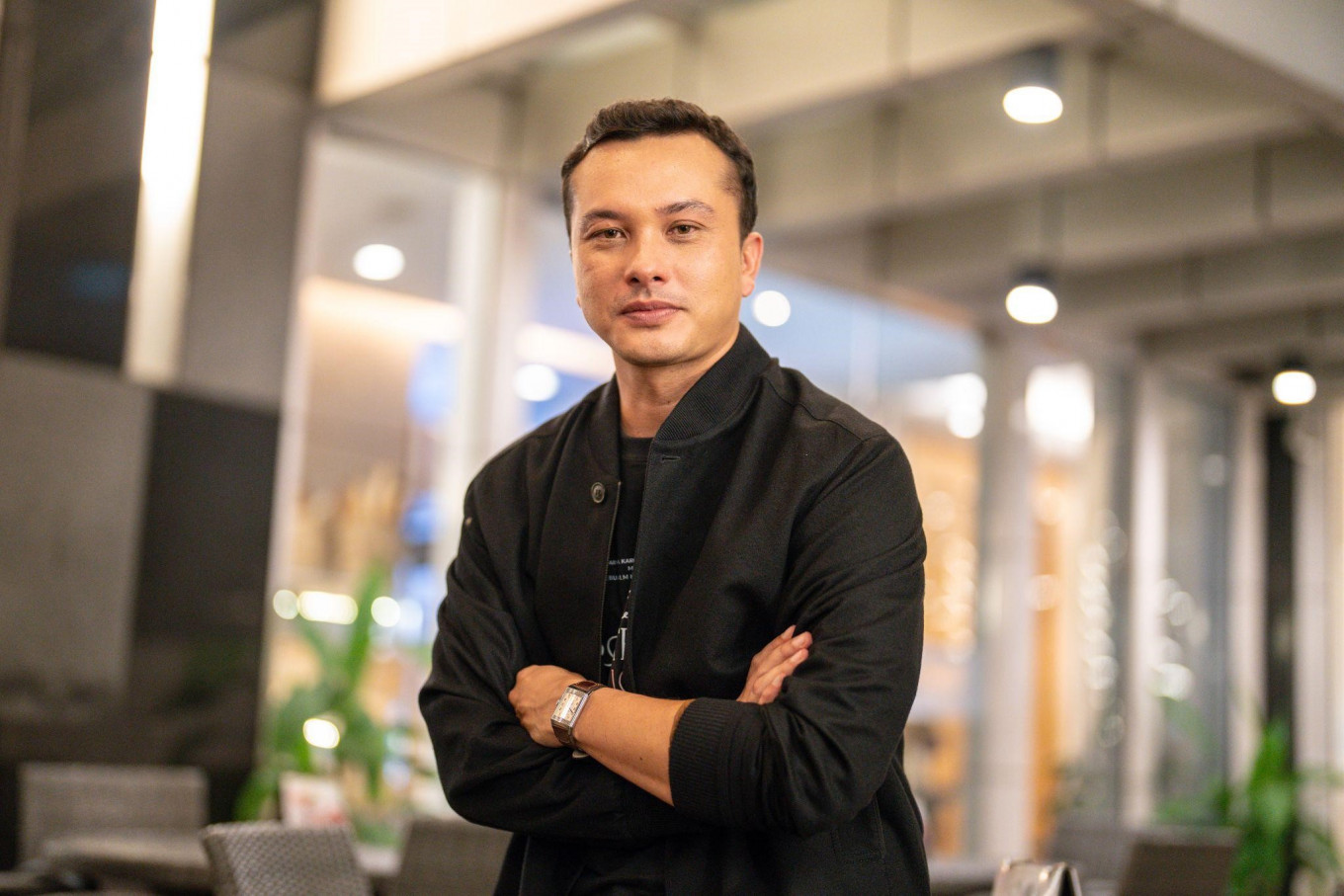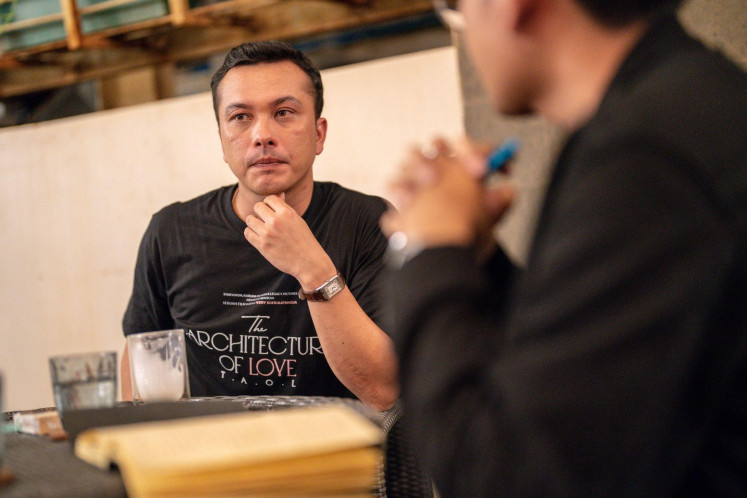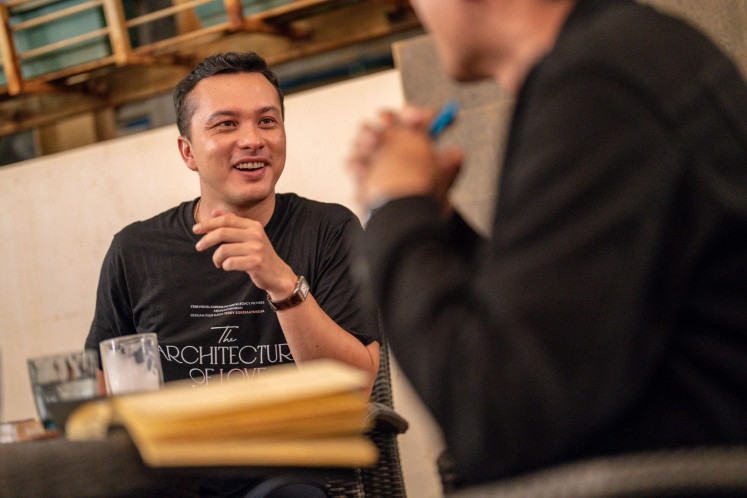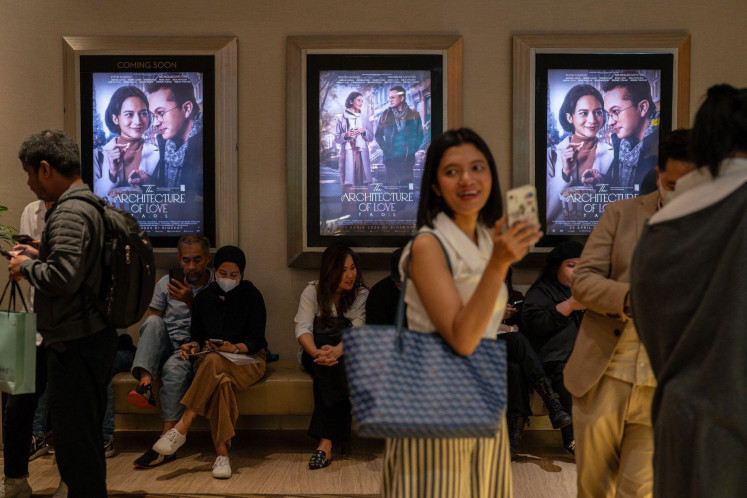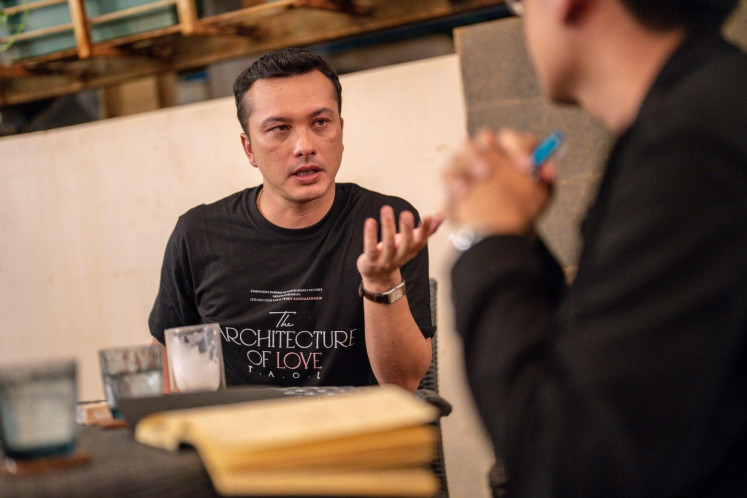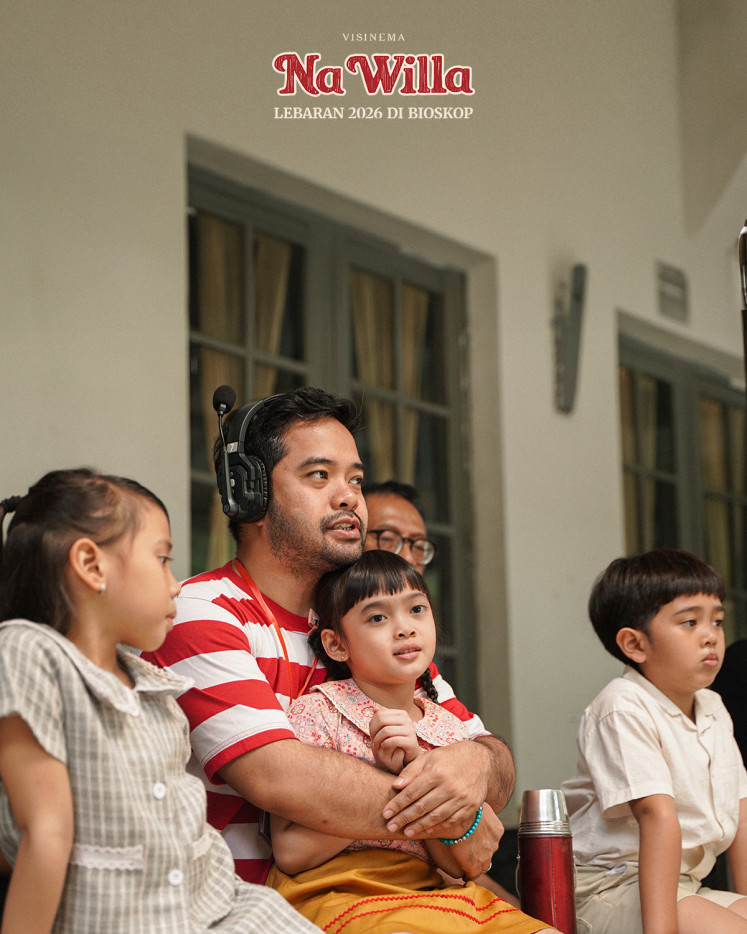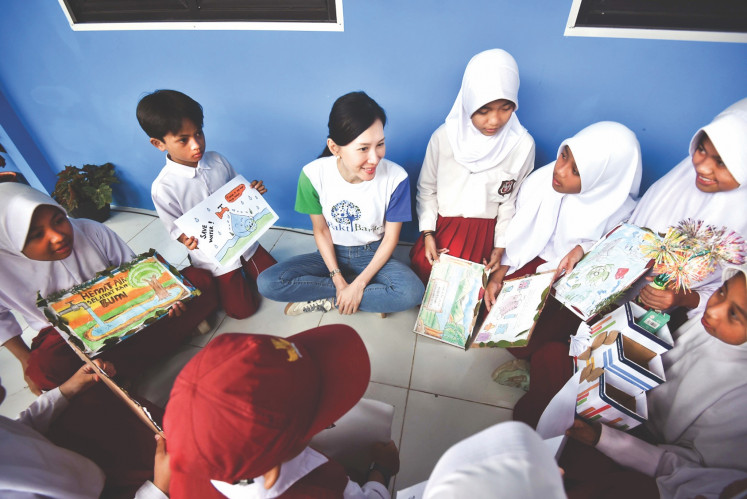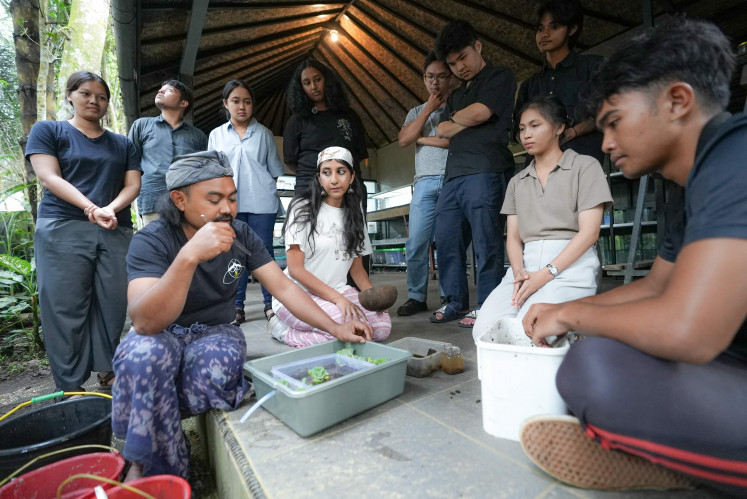(Courtesy of JP/Muhammad Zaenuddin)
Nicholas Saputra exceeded my expectations, and I am not just talking about his performance in The Architecture of Love.
His piercing gaze, both on the screen and in person, remains discerning and faultless even after 22 years of making his mark as an all-around thespian in the Indonesian film industry. His quiet charisma is still powerful enough to keep everyone around him (myself included) on their toes — a living embodiment of a classic leading man whose career continues to be a subject of adoration and envy among the talents that followed his footsteps.
Having said that, during our one-on-one sit-down on April 25, I couldn't help but notice there was a certain joie de vivre brimming underneath his iconic coolness. It was the sort of energy that can only emanate from someone who has seen it all —the peaks and the valleys and everything in between — and yet remains unwavering in his passion for his craft. Over the course of our conversation, Nicholas generously shared his chronicles as an actor (so far) and, of course, his seemingly eternal status as Indonesia's beloved leading man.
One of the many takeaways from our conversation: not once has Nicholas ever put himself on a high pedestal.
"I am just a 'film performer' who has to be ready whenever the character calls for it," he said with a chuckle.
Read also: Must-see Homegrown Silver-screen Adaptations

Thank you!
For signing up to our newsletter.
Please check your email for your newsletter subscription.
(Courtesy of JP/Muhammad Zaenuddin)
A 'film performer', not an 'actor'
Despite my best efforts, it was impossible for me not to bring up the film that catapulted Nicholas to the stratosphere in the first place: the 2002 teen romance Ada Apa dengan Cinta? (What's Up with Love?).
Notwithstanding his newbie status at the time, his instinctive, yet hypnotic performance as a brooding high-schooler caught in an unlikely romance immediately anointed the actor as the heartthrob of the noughties. I was worried that Nicholas might have gotten bored of talking about AADC for what was probably the millionth time. To my surprise, however, not only did he not mind talking about it, he even continued giving accolades to the film that made him who he is today.
"I don't agree that we can discuss my career without mentioning AADC, because that's where I started, and the impact of the film persists to this day," Nicholas said, breaking out a soft smile. "That was the moment I fell in love with films. On my very first day on set, I was convinced that this [acting] was what I was going to do for my entire life."
If AADC put Nicholas on the map, it was his fifth feature, the 2005 Riri Riza-helmed biopic Gie, that cemented him as a talent to watch. For his portrayal of the late activist Soe Hok Gie, he was named Best Actor in a Leading Role at the Festival Film Indonesia 2005. Looking back, 19 years after its release, Nicholas regarded Gie as a "special" one in his filmography.
"Shooting that film pretty much drilled me on how to build endurance in terms of portraying a character in a film," he recalled. "It taught me about professionalism. The processes, including reading, were long and intense. It felt like that was my 'higher education'."
Was Gie the project that truly cemented Nicholas as a proper thespian?
"At the time, I wasn't bold enough to pin on myself the label 'actor' because, back then, 'actor' was a very sacred word," he said. "I was very young at the time, and even though I had already fallen in love with this profession, the sacredness of being an 'actor' was still very lofty. So I wouldn't call myself an 'actor' back then. I preferred referring to myself as a 'film performer' instead. Even now I would still rather call myself a 'film performer'."
His words perhaps reflect how an actor's performance can unexpectedly capture the zeitgeist of a certain era or a certain generation of cinephiles. For instance, while I was charmed by Nicholas thanks to his performance in AADC, several, very much younger, acquaintances of mine started admiring him after seeing the 2007 road trip drama 3 Hari untuk Selamanya (3 Days to Eternity), which is available to stream on Netflix.
The resonance of 3 Hari untuk Selamanya with Gen Z cinephiles might confound the industry, as the film was more narratively challenging and thought-provoking than the more accessible AADC. But perhaps when it comes to good films, there is no such thing as an expiration date.
Nicholas simply opined: "Each film will reach its respective audience regardless of time. And the current technology allows everyone to find themselves in films, to find films that they can relate to."
(Courtesy of JP/Muhammad Zaenuddin)
Out of the comfort zone
The 2000s was what raised Nicholas as an actor. But in the 2010s, he decided to leave his comfort zone and sharpen his craft in art house pics Postcards from the Zoo (2012), Someone's Wife in the Boat of Someone's Husband (2013), and What They Don't Talk About When They Talk About Love (2013). His choice of films could be considered unusual as, at the time, not many actors of his colossal level of fame would even glance at smaller projects.
Nicholas understood the risks of being selective. But he said his unexpected choices were not strategic, but instead driven by the "incredible ideas" conveyed by those films and the people behind them.
"Also, I tend to pedal back when my films grow very popular," he quipped.
His unusual choice, though, would lead to repeated team-ups with the critically acclaimed film director Edwin. The latter, who was credited as the third assistant director of Gie, directed Nicholas in Postcards and Boat as well as the 2018 drama Aruna & Lidahnya (Aruna & Her Palate).
Another left turn in 2013 was Nicholas’ establishment of a film production house alongside Mandy Marahimin, named Talamedia (formerly Tanakhir Films) under which distinctive features such as the 2013 drama Cinta dari Wamena (Love from Wamena) and the 2018 documentary Semesta (Islands of Faith) were born. Little did Nicholas know that he would pave the way for future actors who also wish to dabble as film producers, such as Prilly Latuconsina and Iko Uwais.
Not all his choices led to spectacular success, though. The 2014 action flick Pendekar Tongkat Emas (The Golden Cane Warrior), starring Nicholas alongside Eva Celia, Tara Basro, Reza Rahadian and Christine Hakim, was, to everyone's surprise, a commercial flop.
"We can't plan a film's success," Nicholas said, sagely. "We can only put our knowledge and our experience into the project. [In contrast] we didn't even expect AADC to be a success."
But, as Nicholas experienced later, shocking flops can sometimes be followed by serendipitous success. The Rudi Soedjarwo-helmed Sayap-Sayap Patah (Broken Wings), starring Nicholas and Ariel Tatum, was the Indonesian film industry's Cinderella story of 2022. Despite its initially slow roll-out, the pic later managed to attract at least 2.4 million viewers in theaters alone.
As the old saying goes: people love drama — especially a beautifully directed one.
"That film's theme was actually pretty heavy," Nicholas mused. "Having said that, one of the things I'd like to highlight is Rudi Soedjarwo's ability to create emotional and humanistic scenes that are so effortless and rarely seen. His knowledge and instincts, when it comes to dramatic cruxes, are astonishing."
Read also: How Women Fare in Indonesia
(Courtesy of JP/Muhammad Zaenuddin)
'It's a beautiful dance'
Come 2024, Nicholas has now returned with a brand-new team-up — this time with another distinguished Indonesian film director, Teddy Soeriaatmadja (Lovely Man, Affliction).
An adaptation of Ika Natassa's 2016 novel, The Architecture of Love tells the story of Raia Risjad (played by two-time Citra Award winner Putri Marino), a recently divorced novelist as she unexpectedly encounters River Jusuf (played by Nicholas), an Indonesian architect harboring a dark past, in New York City.
Sparks soon fly between them, but, as their return to Jakarta grows unavoidable, the two must decide how to bring their relationship forward while coming to terms with each other's past. TAOL also stars, to name a few, Jerome Kurnia, Jihane Almira and Omar Daniel.
Despite the film's premise, TAOL turns out to be quite a comforting and feel-good picture. This caught me off guard, considering Nicholas' filmography so far does not give the impression that he’s the type of actor who would join a project as snuggly as TAOL.
But it turns out that Nicholas has long admired Teddy Soeriaatmadja and the latter's "gentle, yet firm" direction.
"The main reason was Teddy," Nicholas asserted. "We've never worked together before. We tried a number of times, but the timing didn't align. This was my first time working with Teddy, and I had faith in his capability to infuse meticulous feelings into whatever story that he brought."
More often than not, an actor's job also includes making a character seem effortless to embody. The flighty yet well-intended River Jusuf may fit like a glove in the hands of Nicholas. However, if the actor were not careful, his Byronic protagonist could come across as either corny or insufferable. Thus, it was imperative to "make River look human".
Was it difficult to find humanity in River Jusuf?
"I wouldn't call it difficult. But was it challenging? Yes. There was a great challenge there," Nicholas said. "It's just that the word 'difficult' has a negative tone to it, as if we had backed out before we started. The word 'challenging', on the other hand, refers to the way to overcome something. I would put it that way instead. Nonetheless, I felt no weight of expectations because I believe, once the character is embodied by the film, he will have his very own persona."
Without spoiling anything, there are things River does that might not sit well with certain audiences. As a veteran of embodying multifaceted characters, Nicholas had no issue separating himself from his character. Moreover, he felt no need to justify his character's actions to be able to immerse himself into the latter's psyche.
(Courtesy of JP/Muhammad Zaenuddin)
"To understand the character was the first phase. Next would be how to execute the character. By the time we're executing the character, we should no longer have any qualms with the character."
And of course, it takes a village to make the best film possible. Nicholas said his teamwork with his co-lead, Putri Marino, was akin to a dance.
"That's why I always avoid the term 'starring opposite' because it implies we are competing against each other," he quipped. "For me, it's always a dance. It's about how to give each other space. Sometimes we must allow each other some time to explore the character, execute them, and then, shine. It's a beautiful dance."
TAOL may hint at a new territory for Nicholas. However, just like Gie, Cinta dari Wamena and even Pendekar Tongkat Emas, there is always a paramount intention — and an even more resonating message — underlying each of his films. In the case of TAOL, it is about time to tell more stories about love, life and the oft-misunderstood chapter that is adulthood.
"This film, I think, will be very refreshing for the Indonesian film audience. Thirty-something romance is a theme that, one could say, is not frequently told. However, this film tackles this theme in such an easy-to-digest fashion as well as a comforting look. It has been a while since the last time we watched an Indonesian film with this kind of theme," Nicholas closed.
Read also: Joko Anwar's Leap of Faith
This article is part of The Weekender, which comes out on the Saturday edition of The Jakarta Post. It offers a variety of lifestyle and culture articles aimed at enriching your reading experience. Subscribe
here to get access to the Saturday edition and all other premium content from the Post.




